Have you ever wondered if upgrading your garage floor could make a dramatic difference in both appearance and function?Garage floor coatings offer more than just a clean look—they can redefine the way you use and value your garage. Whether you want a high-gloss, showroom-like finish or you need durable protection against daily wear and tear, this guide covers all the essential insights about garage floor coatings to help you make the best choice for your space.
Reimagine Your Garage with Premium Garage Floor Coatings
Upgrading your garage floor doesn’t just add a new layer; it transforms the entire space into a cleaner, brighter, and more functional area. Garage floor coatings—ranging from classic epoxy floor systems to modern polyurea coatings—provide robust protection against stains, chemicals, and daily foot and vehicle traffic. Over the years, these advanced floor coatings have also become a preferred solution for converting dusty concrete garage floors into sleek, professional-looking environments. Consumers now expect not only aesthetics but serious performance from garage floor treatments such as floor paint, polyurea, and more.
Imagine parking your car on a surface that looks as pristine as a high-end showroom and is easier to clean and maintain than plain concrete. Modern epoxy flooring and advanced coatings resist oil, salt, and spills, ensuring your investment lasts for years to come. Plus, this improvement can significantly increase the value of your property and unlock new possibilities—think workshop, fitness studio, or hobby zone—in your own garage. From choice of product to installation, this comprehensive guide will walk you through every step of upgrading your garage with a premium floor coating.
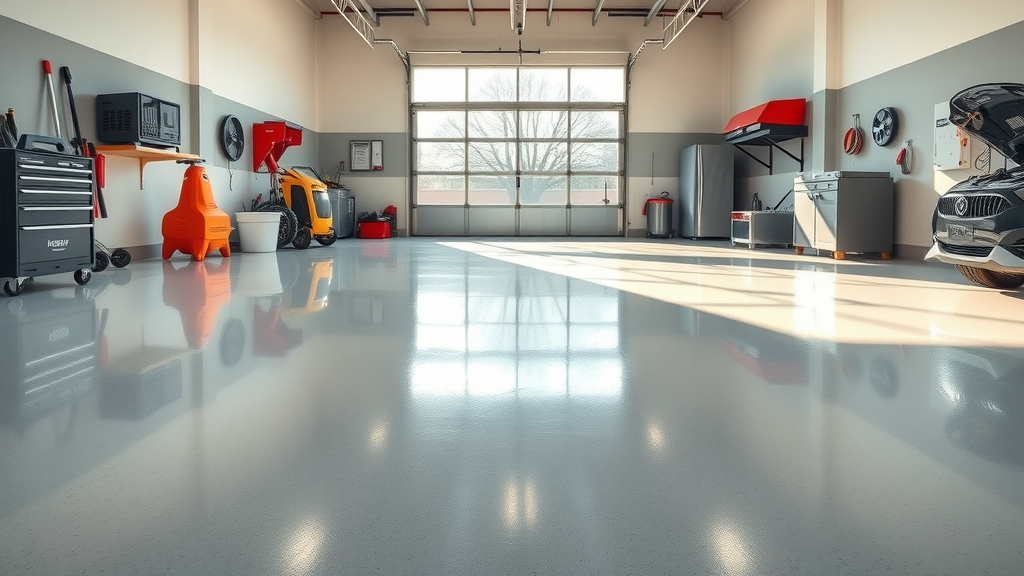
What You'll Learn About Garage Floor Coatings
- Key features and benefits of top garage floor coatings
- Types of floor coatings available for garages
- How to choose the best epoxy floor or floor paint
- Real-world reviews and performance insights
- Installation and maintenance guidance
- Pricing insights and how to get the best value
- Answers to frequently asked questions
Garage Floor Coatings Overview: Why Upgrade Your Garage Floor?
Why do more homeowners than ever invest in garage floor coatings? The answer lies in the combination of aesthetics, durability, and functional upgrades they provide. While unfinished concrete floors are vulnerable to dusting, cracking, stains, and water intrusion, modern floor coating systems act as a protective shield. They minimize damage from hot tires, chemicals, and moisture—issues particularly problematic years ago before advancements in epoxy coatings and polyurea coatings. An upgrade offers a high gloss finish that’s often easier to clean and maintain than bare concrete, and specialty floor paint or a professional epoxy floor coating can help conceal previous flaws or wear from heavy use.
An upgraded garage floor also means less time spent cleaning and more satisfaction every time you step inside. It’s about upgrading your garage into a multi-purpose room—suitable for storage, parking, hobbies, or entertaining. On top of this, garage floor coatings can boost property value and curb appeal. Whether it's a one-car garage or a dedicated workshop, investing in a robust floor coating system ultimately pays off with lasting results.
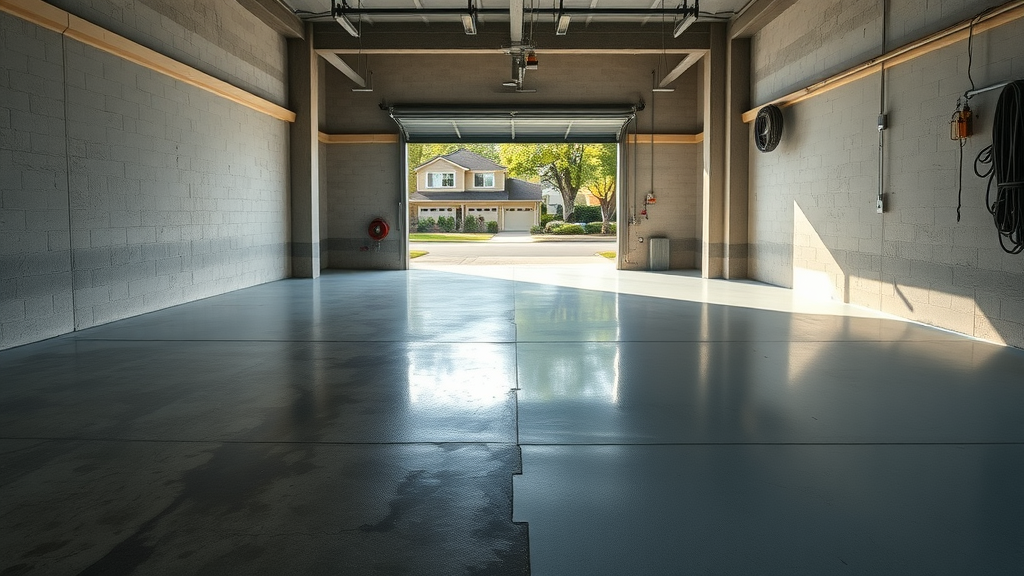
Types of Garage Floor Coatings: Comparing Epoxy Floor, Polyurea, and Floor Paint
Choosing the best garage floor coating means understanding your options and what each brings to the table. The market now offers a wide spectrum—ranging from do-it-yourself floor paint to robust epoxy floor systems and the latest in polyurea coating technology. Each type differs in terms of application process, durability, chemical resistance, and cost. Whether your priority is a budget-friendly upgrade for a one-car garage or an industrial-grade solution for heavy use, the right coating system is out there.
Let’s examine the most popular types of garage floor coatings available today:
- Epoxy floor coatings
- Garage floor paint
- Polyurea coating
- Concrete sealer
- Floor tiles and alternative floor coverings
Epoxy Floor Coatings: Features, Pros & Cons
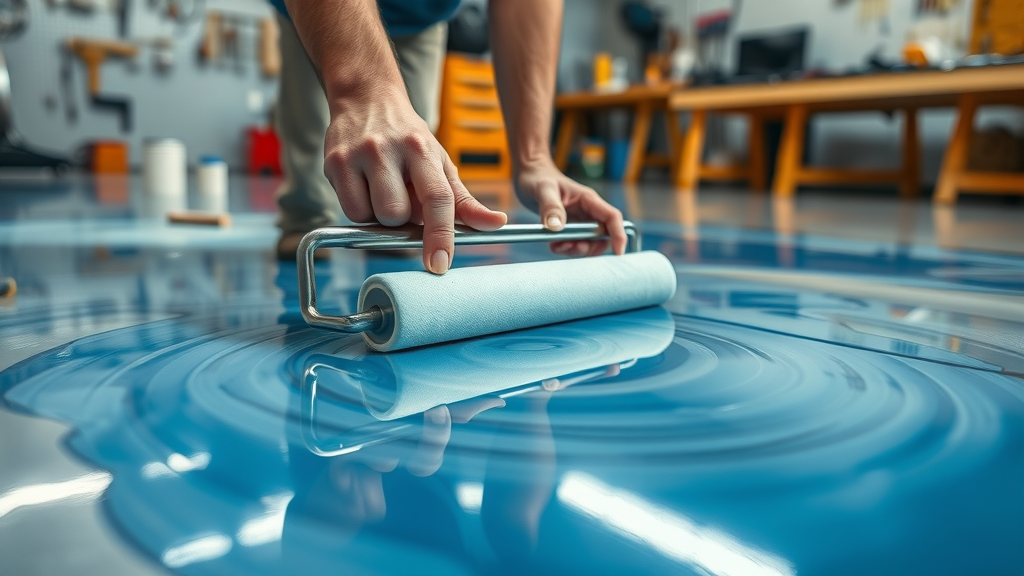
Epoxy floor coatings are one of the most widely recognized and trusted choices for garage floors. Their two-part chemical formula bonds tightly with the concrete surface, creating a durable, protective layer that resists staining, abrasion, and impact. Available in a wide array of colors and finishes—including flakes and high gloss styles—epoxy floors can enhance the look of any garage while significantly improving performance. In fact, many epoxy flooring products can last for a decade or longer, making them a versatile option for both high-traffic residential and commercial spaces.
However, epoxy does have a few considerations. Proper prep of the concrete floor is critical for adhesion—and any shortcuts may lead to peeling or bubbling months or years later. Temperature and humidity can also affect curing, so installation in extreme climates can require professional oversight. Despite this, with careful installation, epoxy remains an excellent long-lasting option for those seeking superior protection with customizable style in their garage floor coating.
Garage Floor Paint: Budget-Friendly Floor Coating Option
If budget is a top concern, garage floor paint is a tried-and-true solution for updating a concrete floor. Most commonly, these paints are formulated with acrylic or latex resins, sometimes reinforced with a small amount of epoxy for better adhesion and wear resistance. Floor paint is a simple way to inject color and uniformity into tired, stained, or patchy garage floors—often requiring less preparation than full epoxy or polyurea systems. It's a best-fit for one-car garages, rental spaces, or as a quick cosmetic refresh. Application tools are familiar—roller, paintbrush, and sometimes an extension pole—and drying times are faster than with many other options.
While floor paint upgrades are cost-effective and easy for DIYers, they typically don’t last as long as true epoxy coatings or polyurea. The finish may chip, fade, or become stained over time, especially under heavy use or exposure to harsh chemicals. Frequent reapplication (every few years) is often necessary to maintain a fresh appearance. Still, for many, the low upfront investment and improved aesthetics make garage floor paint a logical starting point in upgrading your garage.
Polyurea Coating: The Next Generation of Garage Floor Coatings
Polyurea coatings are quickly establishing themselves as the gold standard for garage floor coatings, especially for homeowners seeking rapid installation and maximum toughness. Polyurea is chemically engineered to be incredibly flexible and resistant to chemicals, abrasions, UV rays, and impact. Unlike traditional epoxy floor coatings, polyurea can be applied in virtually any temperature and cures within hours, making same-day return-to-service a possibility—perfect for busy families or commercial environments.
The main advantage of polyurea coating systems is their longevity and performance. While often more expensive than standard epoxy coatings or garage floor paint, they require less maintenance over time and display unmatched resistance to peeling, yellowing, and cracking. Polyurea’s rapid cure time also reduces the risk of installation delays. If you want a next-level garage floor coating that stands up to even the toughest conditions, polyurea is a leading choice.
Specialty Products: Floor Coating Kits and Concrete Sealers
For DIYers, floor coating kits offer bundled convenience—combining resins, hardeners, decorative flakes, rollers, and instructional guides in a single package. These kits typically include floor paints or epoxy-based solutions and are designed to make self-installation as straightforward as possible. Many leading brands now provide coating kits that are effective for both 1 car garage and 2 car garage spaces. If you want a straightforward way to get all the necessary materials for a professional-looking garage floor coating, a kit can be a game-changer.
Meanwhile, concrete sealers are clear coatings that soak into the concrete, providing basic protection against spills and dusting without changing the floor’s appearance. Although not as robust as epoxy or polyurea, sealers are ideal for garages with low traffic or as a quick freshening step before installing a more advanced floor coating or floor covering later. Specialty floor treatments also include interlocking floor tiles and roll-out mats—great for renters or anyone wanting minimal prep and instant results.
Choosing the Right Garage Floor Coating for Your Needs
Picking the right garage floor coating requires more than just comparing price tags. Homeowners and businesses must consider the demands of their space: Will the area see frequent vehicle use? Do you need top-tier chemical resistance and durability for a workshop or a simple cosmetic boost for storage? Pay attention to square footage—larger, multi-car garages may need higher-performance systems like polyurea, while single car garages or secondary storage spaces may do well with premium garage floor paint kits.
Beyond performance, aesthetics also play a role. High gloss finishes create a modern, refined appearance and can make your garage feel brighter and larger. For heavy-duty needs, epoxy and polyurea systems are favored, while budget and minimal disruption may make DIY floor coating kits or floor tiles the optimal choice. Always consider maintenance requirements, longevity, and how well the coating complements your lifestyle. Comparing the pros, cons, and chemistry of epoxy floor, polyurea, and alternative floor coatings ensures you invest in a product that meets your durability expectations and style goals.
- Assessing durability, chemical resistance, and aesthetics
- Garage size and usage considerations (1 car garage, 2 car garage, workshop spaces)
- Comparing coating systems, epoxy floor, polyurea, and garage floor paints
| Type | Durability | Cost (Per Sq. Ft.) | Longevity | Maintenance |
|---|---|---|---|---|
| Epoxy Floor Coating | High | $3–$7 | 10–15 years | Low–Moderate |
| Polyurea Coating | Very High | $5–$10 | 15–20+ years | Very Low |
| Garage Floor Paint | Moderate | $1–$3 | 2–5 years | Moderate–High |
Garage Floor Coating Installation: DIY vs Professional Application
The decision between DIY and professional garage floor coating installation often comes down to complexity, budget, and confidence with home improvement tools. DIY floor coating kits are more accessible than ever, including detailed instructions, and are suitable for those willing to commit the time to precise surface prep and application. For many, successfully completing a garage floor paint project is a satisfying and cost-effective undertaking. Be prepared, however, to invest in tools such as concrete cleaners, extension poles, rollers, and personal protective equipment, and to follow the manufacturer’s directions for mixing and application to the letter.
- Step-by-step DIY floor coating guide
- Professional installation: What to expect
- Factors that influence project success (surface prep, climate, materials)
If you want flawless results—especially for an epoxy floor or polyurea coating—professional installers bring expertise in addressing underlying concrete issues, ensuring perfect application, and minimizing disruptions. They manage crucial variables like humidity, temperature, and curing time, reducing the risk of adhesion problems that could shorten the coating's lifespan. While professional services are typically pricier up front, they can be the best investment for long-term performance and for garages that demand the most robust, seamless floor coatings.

"Installing a premium garage floor coating not only enhances your garage’s appearance, but it also safeguards the concrete from wear, spills, and seasonal changes." — Leading Contractor, Garage Innovations
Real Customer Reviews: Garage Floor Coatings in Action
Nothing speaks louder than the real-world experiences of homeowners who have invested in garage floor coatings. Reviews and testimonials provide invaluable insight into the longevity, maintenance, and daily rewards of a newly upgraded garage floor. Many satisfied users note that a high gloss epoxy floor or polyurea system has kept their garage spotless for years, even in areas with extreme heat, snow, or high humidity. Customers appreciate the ease of cleaning—quickly removing spilled oil or mud without worry—and how the improved lighting and bright reflection make the space feel transformed.
Coating kits are frequently praised for their convenience and clear instructions, especially from DIYers upgrading smaller garages. Meanwhile, owners of professionally installed polyurea floors highlight the product’s impressive resilience and near-seamless look, stating that their garage floor coating still looks new after many years of use. Reviews also commonly reference increased property value and personal satisfaction after making this investment. If you’re considering upgrading your garage, examining user reviews for specific brands and products is one of the smartest moves you can make.
- Garage floor testimonials: epoxy floor experiences
- Reviews for coating kit and coating system products
- Insights on long-term durability and satisfaction

Garage Floor Coatings Cost: Pricing Guide and Value Analysis
One of the key considerations for any garage floor coating project is cost. The price to upgrade your garage can vary significantly depending on factors like the size of your garage (1 car garage vs. 2 car garage), the type of coating system chosen, and whether you opt for a DIY approach or professional installation. For a basic garage floor paint solution, the investment is often minimal and well-suited to those working with a tighter budget. Epoxy floor coating systems represent a mid-tier expense, while premium polyurea coatings generally require a larger up-front investment due to their enhanced performance and longevity.
Several variables impact total price: square footage, the current state of the concrete floor, any needed repairs, geographic location, and selection of additional visual features or surface customizations. When comparing costs, factor in the coating’s lifespan and expected maintenance; sometimes, a more expensive product saves money over the years by reducing reapplication needs. Here’s a cost breakdown by coating type and garage size:
- Average cost for 1 car and 2 car garage floor coating
- What impacts the price of a floor coating system?
- Floor paint vs epoxy floor coating cost breakdown
| Garage Size | Garage Floor Paint | Epoxy Floor Coating | Polyurea Coating |
|---|---|---|---|
| 1 Car Garage (200–300 sq ft) | $200–$700 | $600–$2,000 | $1,000–$3,000 |
| 2 Car Garage (400–600 sq ft) | $400–$1,200 | $1,200–$3,500 | $2,400–$6,000 |
Maintenance Tips for Long-Lasting Garage Floor Coatings
Once you’ve invested in garage floor coatings, maximizing their lifespan is key. Fortunately, modern floor coatings require relatively simple upkeep compared to untreated concrete. Regular cleaning with a soft-bristle broom or microfiber mop prevents dust and grit from scratching high-gloss finishes. For most spills, a damp mop with mild soap is sufficient. To keep the floor looking its best, consider resealing or recoating every few years (depending on the system used and the level of wear and tear). Most epoxy floor and polyurea coatings are chemical resistant, making them ideal for busy, functional spaces where durability matters.
- Cleaning and care for floor coatings
- When to recoat or reseal
- How to prolong lifespan of your garage floor coatings
If your garage doubles as a workshop or exercise area, using mats or rugs under heavy equipment minimizes scratching or indentations. Promptly cleaning chemicals and avoiding tire marks by letting hot tires cool before parking can also extend the lifetime of your investment. This simple routine helps protect your garage against the wear that, years ago, could have led to unsightly cracks or unnecessary repairs on bare concrete.
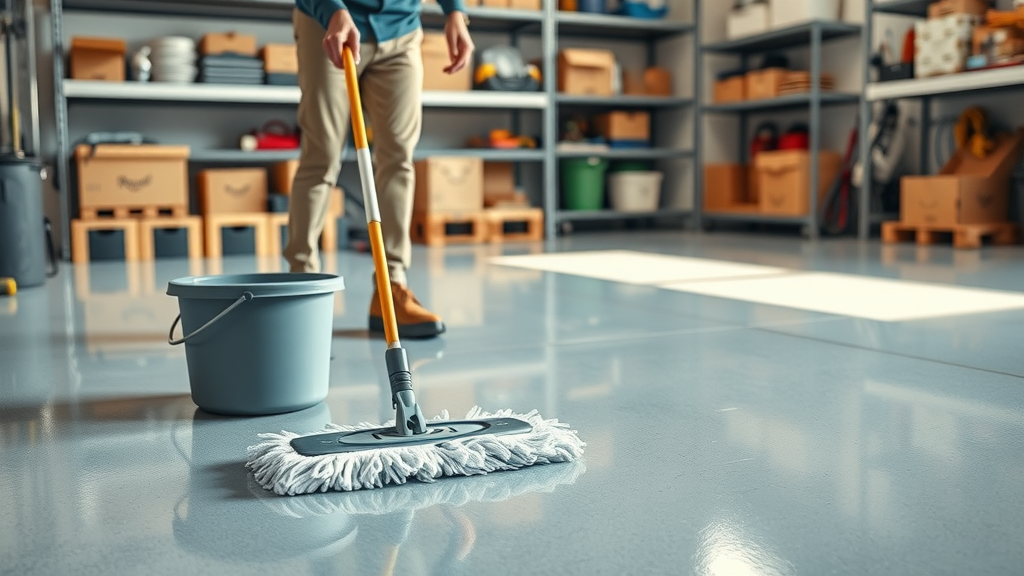
People Also Ask About Garage Floor Coatings
What is the best coating for garage floors?
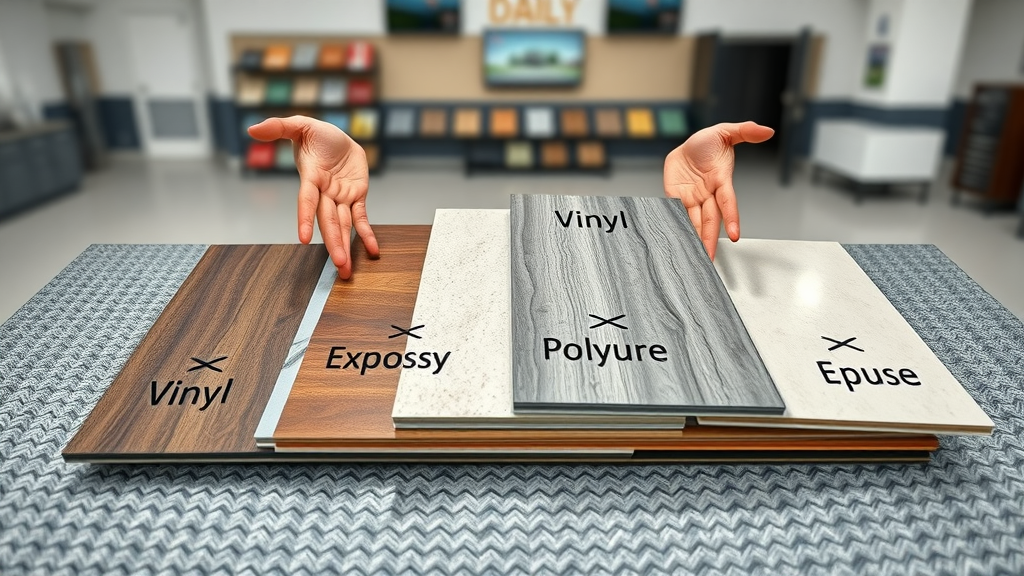
The best coating for garage floors depends on your priorities. Polyurea coatings offer unmatched durability, flexibility, and rapid curing—ideal for busy garages or commercial applications. Epoxy floor coatings remain a top choice for homeowners seeking both visual appeal and solid protection for a moderate investment. Garage floor paints are the most affordable and DIY-friendly option, but require more frequent reapplication. For those prioritizing longevity, chemical resistance, and low maintenance, polyurea systems usually come out on top.
How much does a 2 car garage floor coating cost?
The cost for coating a 2 car garage (roughly 400–600 square feet) varies by coating system and installation method. DIY garage floor paints start around $400, but may need reapplication every 2–5 years. Epoxy floor coatings installed professionally range from $1,200 to $3,500, providing long-term value. Polyurea coatings are premium options, often costing $2,400–$6,000, but deliver industry-leading durability, minimal maintenance, and quick installation.
Is coating a garage floor worth it?
Coating your garage floor is almost always worth the investment for several reasons: improved appearance, ease of cleaning, increased protection against stains and abrasion, and enhanced property value. High quality coatings can transform your garage from a basic storage area into a multi-purpose room, reduce long-term maintenance, and safeguard your concrete for years. Many homeowners report satisfaction and even regret for not having coated their garage floors years ago!
What are the downsides of epoxy garage floors?
While epoxy garage floors are durable and attractive, they do have some limitations. Proper surface prep is essential—otherwise, the coating may peel or bubble. Epoxy can also be sensitive to moisture or extreme temperatures during application, which sometimes requires professional expertise. In heavy-use scenarios or areas with frequent freeze-thaw cycles, polyurea coatings may outperform traditional epoxies. Regular maintenance and prompt cleaning of spills will help reduce slip risks on glossy surfaces.
Key Takeaways: Garage Floor Coatings
- Modern garage floor coatings protect, beautify, and enhance property value
- Several options exist, from epoxy floor systems to advanced polyurea coatings
- Choosing the right floor coating is essential for satisfaction and durability
- Professional installation ensures optimal performance
Frequently Asked Questions About Garage Floor Coatings
-
How long do garage floor coatings last?
High-quality epoxy floor coatings typically last 10–15 years, while polyurea coatings can exceed 20 years with proper care. Garage floor paints require more frequent reapplication. -
Can you install floor coatings over existing garage floor paint?
Yes, but the old paint must be clean, well-adhered, and may need sanding or etching for new coatings to bond properly. -
How do you prep a concrete floor for coating?
Prep involves cleaning, repairing cracks, removing old coatings, and etching or grinding the surface for optimal adhesion. -
Are floor coatings safe for pets and children?
Once fully cured, most floor coatings are non-toxic and safe for families and pets; always check product labels for specifics. -
Do garage floor coatings increase resale value?
Yes—an attractive, durable garage floor is an appealing upgrade for prospective buyers and can improve market value.
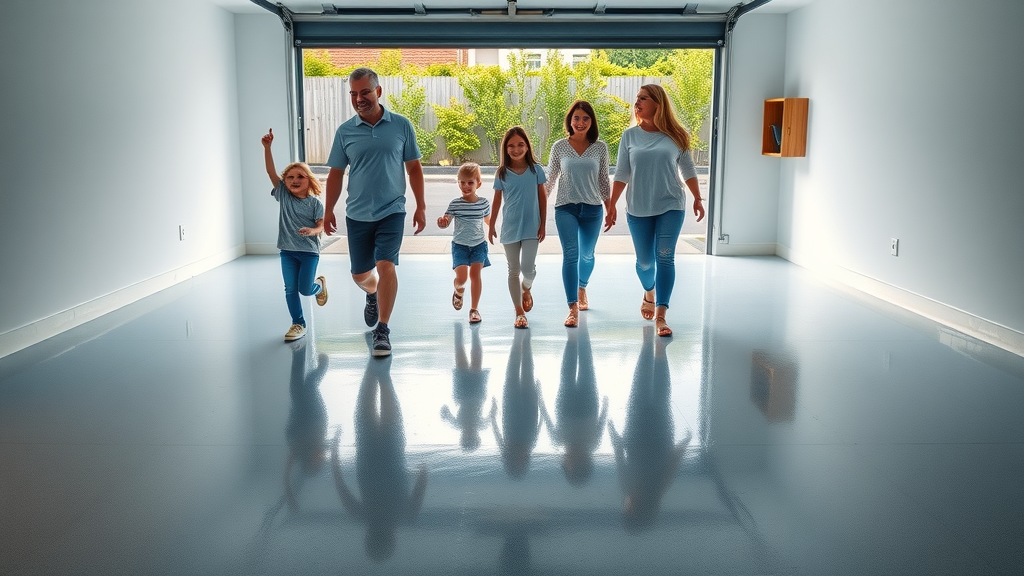
Conclusion: Enhance Your Space with Garage Floor Coatings
Garage floor coatings deliver protection, curb appeal, and lasting value—upgrade your space and experience the difference today.
 Add Row
Add Row  Add
Add 

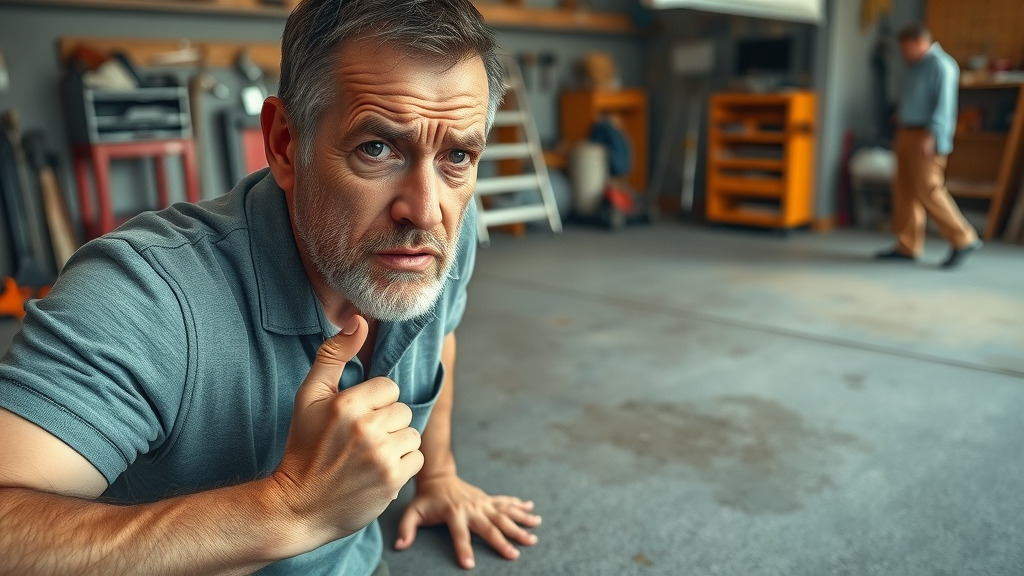
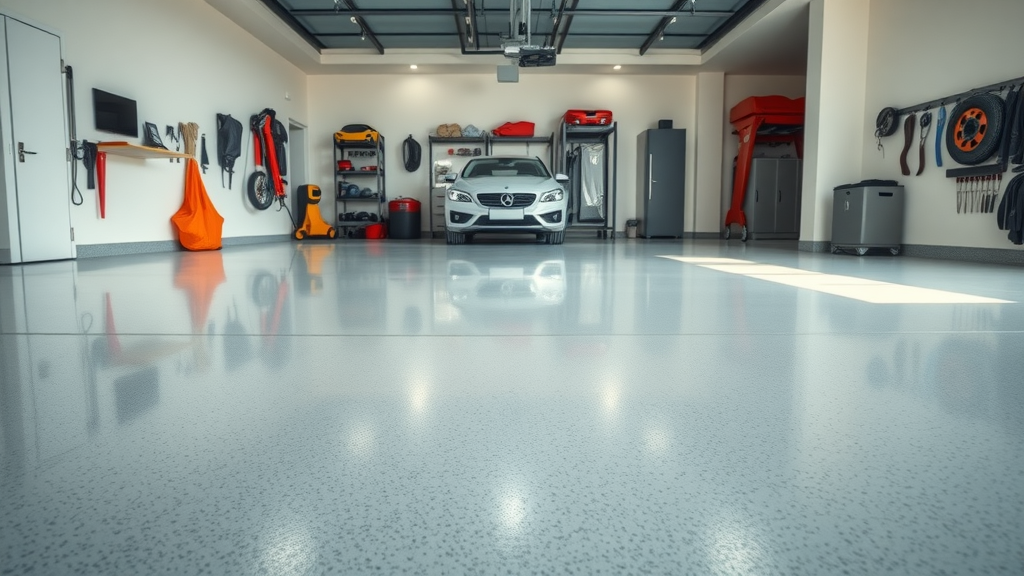

Write A Comment